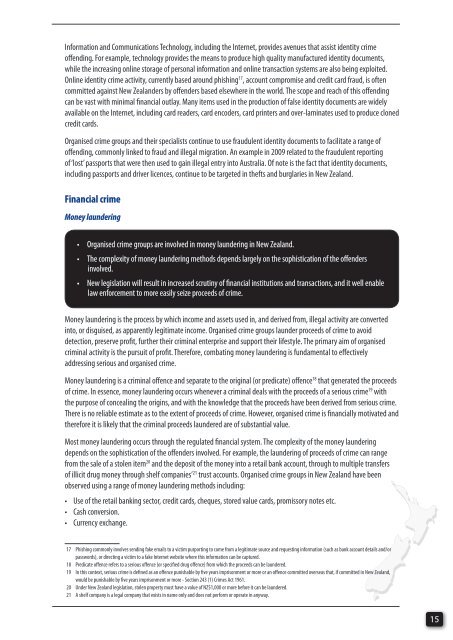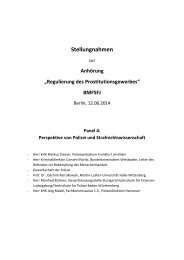Organised-Crime-in-NZ-2010-Public-Version
Organised-Crime-in-NZ-2010-Public-Version
Organised-Crime-in-NZ-2010-Public-Version
Create successful ePaper yourself
Turn your PDF publications into a flip-book with our unique Google optimized e-Paper software.
Information and Communications Technology, <strong>in</strong>clud<strong>in</strong>g the Internet, provides avenues that assist identity crime<br />
offend<strong>in</strong>g. For example, technology provides the means to produce high quality manufactured identity documents,<br />
while the <strong>in</strong>creas<strong>in</strong>g onl<strong>in</strong>e storage of personal <strong>in</strong>formation and onl<strong>in</strong>e transaction systems are also be<strong>in</strong>g exploited.<br />
Onl<strong>in</strong>e identity crime activity, currently based around phish<strong>in</strong>g 17 , account compromise and credit card fraud, is often<br />
committed aga<strong>in</strong>st New Zealanders by offenders based elsewhere <strong>in</strong> the world. The scope and reach of this offend<strong>in</strong>g<br />
can be vast with m<strong>in</strong>imal f<strong>in</strong>ancial outlay. Many items used <strong>in</strong> the production of false identity documents are widely<br />
available on the Internet, <strong>in</strong>clud<strong>in</strong>g card readers, card encoders, card pr<strong>in</strong>ters and over-lam<strong>in</strong>ates used to produce cloned<br />
credit cards.<br />
<strong>Organised</strong> crime groups and their specialists cont<strong>in</strong>ue to use fraudulent identity documents to facilitate a range of<br />
offend<strong>in</strong>g, commonly l<strong>in</strong>ked to fraud and illegal migration. An example <strong>in</strong> 2009 related to the fraudulent report<strong>in</strong>g<br />
of ‘lost’ passports that were then used to ga<strong>in</strong> illegal entry <strong>in</strong>to Australia. Of note is the fact that identity documents,<br />
<strong>in</strong>clud<strong>in</strong>g passports and driver licences, cont<strong>in</strong>ue to be targeted <strong>in</strong> thefts and burglaries <strong>in</strong> New Zealand.<br />
F<strong>in</strong>ancial crime<br />
Money launder<strong>in</strong>g<br />
• <strong>Organised</strong> crime groups are <strong>in</strong>volved <strong>in</strong> money launder<strong>in</strong>g <strong>in</strong> New Zealand.<br />
• The complexity of money launder<strong>in</strong>g methods depends largely on the sophistication of the offenders<br />
<strong>in</strong>volved.<br />
• New legislation will result <strong>in</strong> <strong>in</strong>creased scrut<strong>in</strong>y of f<strong>in</strong>ancial <strong>in</strong>stitutions and transactions, and it well enable<br />
law enforcement to more easily seize proceeds of crime.<br />
Money launder<strong>in</strong>g is the process by which <strong>in</strong>come and assets used <strong>in</strong>, and derived from, illegal activity are converted<br />
<strong>in</strong>to, or disguised, as apparently legitimate <strong>in</strong>come. <strong>Organised</strong> crime groups launder proceeds of crime to avoid<br />
detection, preserve profit, further their crim<strong>in</strong>al enterprise and support their lifestyle. The primary aim of organised<br />
crim<strong>in</strong>al activity is the pursuit of profit. Therefore, combat<strong>in</strong>g money launder<strong>in</strong>g is fundamental to effectively<br />
address<strong>in</strong>g serious and organised crime.<br />
Money launder<strong>in</strong>g is a crim<strong>in</strong>al offence and separate to the orig<strong>in</strong>al (or predicate) offence 18 that generated the proceeds<br />
of crime. In essence, money launder<strong>in</strong>g occurs whenever a crim<strong>in</strong>al deals with the proceeds of a serious crime 19 with<br />
the purpose of conceal<strong>in</strong>g the orig<strong>in</strong>s, and with the knowledge that the proceeds have been derived from serious crime.<br />
There is no reliable estimate as to the extent of proceeds of crime. However, organised crime is f<strong>in</strong>ancially motivated and<br />
therefore it is likely that the crim<strong>in</strong>al proceeds laundered are of substantial value.<br />
Most money launder<strong>in</strong>g occurs through the regulated f<strong>in</strong>ancial system. The complexity of the money launder<strong>in</strong>g<br />
depends on the sophistication of the offenders <strong>in</strong>volved. For example, the launder<strong>in</strong>g of proceeds of crime can range<br />
from the sale of a stolen item 20 and the deposit of the money <strong>in</strong>to a retail bank account, through to multiple transfers<br />
of illicit drug money through shelf companies’ 21 trust accounts. <strong>Organised</strong> crime groups <strong>in</strong> New Zealand have been<br />
observed us<strong>in</strong>g a range of money launder<strong>in</strong>g methods <strong>in</strong>clud<strong>in</strong>g:<br />
• Use of the retail bank<strong>in</strong>g sector, credit cards, cheques, stored value cards, promissory notes etc.<br />
• Cash conversion.<br />
• Currency exchange.<br />
17 Phish<strong>in</strong>g commonly <strong>in</strong>volves send<strong>in</strong>g fake emails to a victim purport<strong>in</strong>g to come from a legitimate source and request<strong>in</strong>g <strong>in</strong>formation (such as bank account details and/or<br />
passwords), or direct<strong>in</strong>g a victim to a fake Internet website where this <strong>in</strong>formation can be captured.<br />
18 Predicate offence refers to a serious offence (or specified drug offence) from which the proceeds can be laundered.<br />
19 In this context, serious crime is def<strong>in</strong>ed as an offence punishable by five years imprisonment or more or an offence committed overseas that, if committed <strong>in</strong> New Zealand,<br />
would be punishable by five years imprisonment or more - Section 243 (1) <strong>Crime</strong>s Act 1961.<br />
20 Under New Zealand legislation, stolen property must have a value of <strong>NZ</strong>$1,000 or more before it can be laundered.<br />
21 A shelf company is a legal company that exists <strong>in</strong> name only and does not perform or operate <strong>in</strong> anyway.<br />
15



